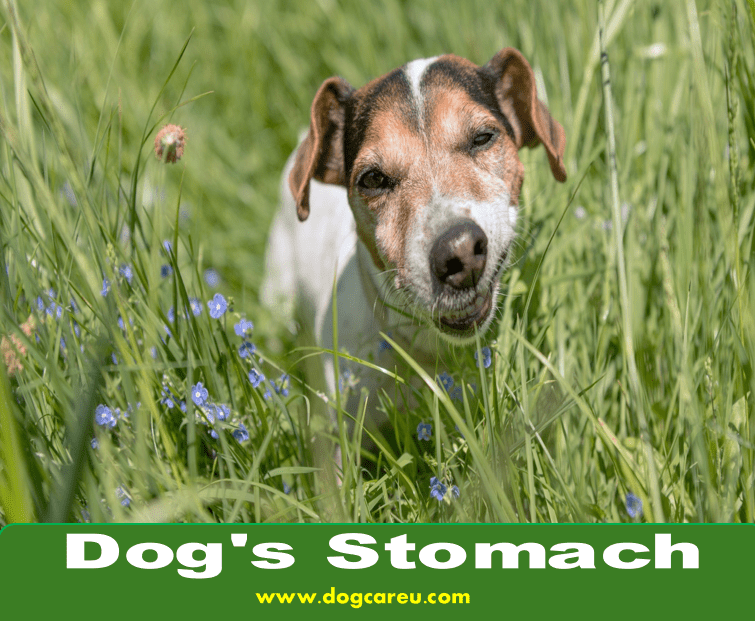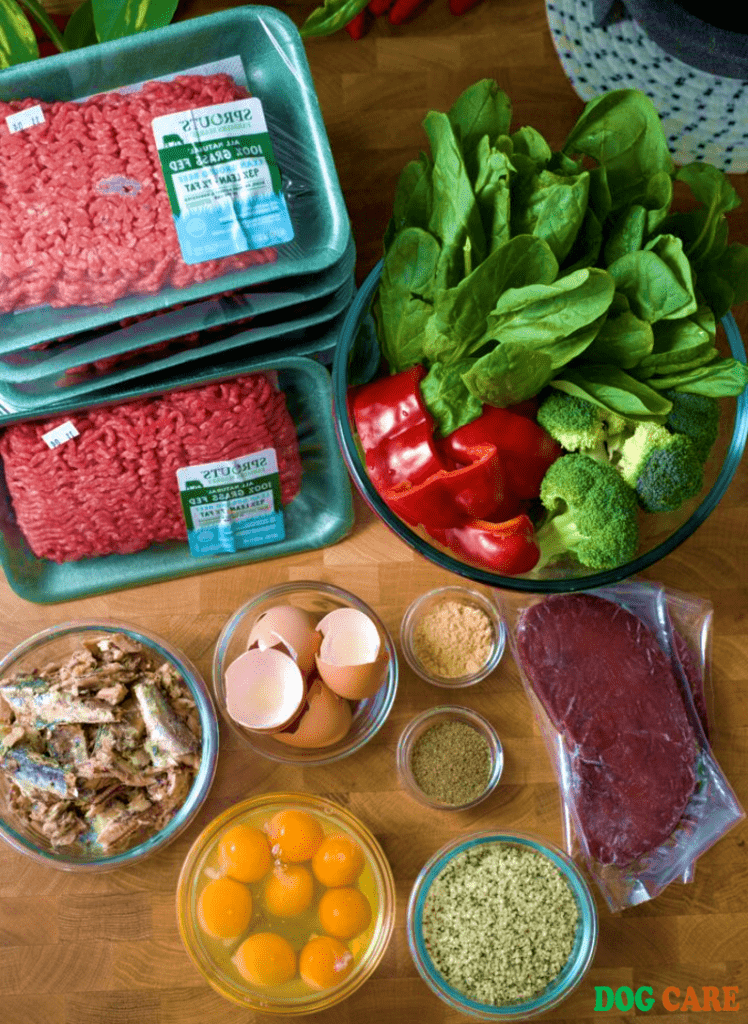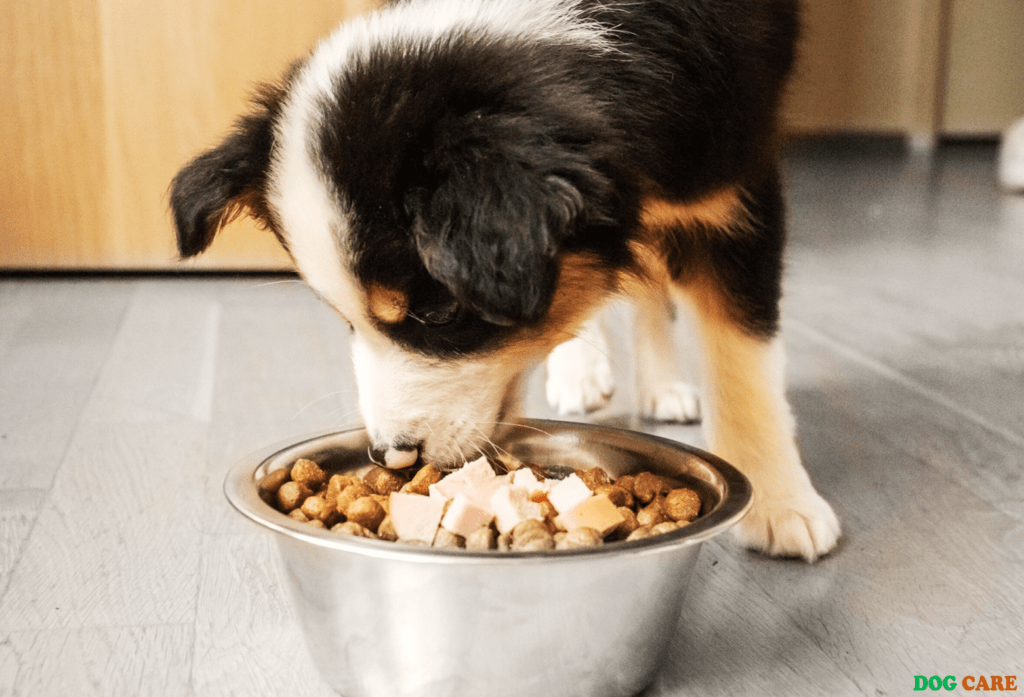Dog’s Stomach: When your dog’s stomach gurgles when it eats grass, it’s likely due to an upset stomach. Dogs instinctively eat grass to soothe their stomachs; however, if the gurgling is accompanied by vomiting or diarrhea, it indicates digestive upset.
Seeking veterinary care is advisable if the noises persist or your dog shows signs of illness. Grass consumption could exacerbate digestive issues, causing vomiting in some dogs and necessitating caution when allowing grass grazing. Understanding the reasons behind your dog’s behaviors and paying attention to their overall health is crucial in managing stomach gurgling and grass-eating habits to ensure your furry friend’s well-being and comfort.

Understanding Dog’s Stomach Noises
Dogs are known for their quirky eating habits, and one common behavior is consuming grass when their stomachs make unusual noises. Understanding the reasons behind a dog’s stomach noises and grass-eating behavior is crucial for pet owners to ensure their furry friend’s well-being.
Causes Of Stomach Noises
- Digestive Upset
- Intestinal Parasites
- Bowel Obstruction
- Malnutrition
- Colitis
- Constipation
- Hunger Instinct
- Stress
When a dog experiences any of these issues, their stomach may produce unusual sounds, resulting in discomfort and prompting them to seek relief by consuming grass.
When To Worry About Stomach Noises
If a dog’s stomach noises are accompanied by symptoms such as significant lethargy, decreased appetite or thirst, diarrhea, or vomiting, it is essential to seek veterinary care immediately. These indicators signal a more serious underlying health issue that requires professional attention.

Why Dogs Eat Grass
Dogs often eat grass when their stomachs are upset. This behavior usually indicates they are trying to relieve their discomfort.
Relief For Upset Stomach
When a dog’s stomach is upset, it may start eating grass to alleviate its discomfort. This instinctual behavior soothes the digestive system.
Behavioral Considerations
If your dog is constantly eating grass, it’s essential to consider the behavior and potential underlying reasons. This could be due to boredom, dietary deficiencies, or simply because the dog enjoys the taste and texture of grass.
Observing your dog’s behavior and consulting with a veterinarian can help determine if any behavioral factors influence its grass-eating habits.
Indications Of Dog’s Upset Stomach
If your dog’s stomach makes noises and eats grass, it strongly indicates an upset stomach. Dogs often eat grass to soothe their stomachs and settle their digestion.
Skipping Meals
One of the indications of a dog’s upset stomach is when they start skipping meals. If your dog is usually enthusiastic about mealtime but suddenly loses interest in eating, it could be a sign of digestive discomfort. Skipping meals can happen for various reasons, such as a mild stomachache, indigestion, or even the presence of intestinal parasites. Keep a close eye on your dog’s eating habits and consult a veterinarian if their appetite doesn’t return to normal within a day or two.
Vomiting And Diarrhea
Vomiting and diarrhea are often associated with an upset stomach in dogs. If your dog is experiencing these symptoms along with their stomach making noises and eating grass, it indicates that their digestive system is not functioning properly. Vomiting helps a dog expel any unwanted substances from their stomach, while diarrhea is the body’s way of getting rid of irritants. Both symptoms can be alarming, especially if they persist or worsen. To ensure your dog’s well-being, consult a veterinarian if vomiting or diarrhea continues for more than a day.
It’s important to note that while occasional vomiting or diarrhea may occur in dogs, persistent or severe cases may indicate a more serious underlying issue, such as bowel obstruction or colitis. Prompt veterinary attention is necessary to diagnose and treat these conditions effectively.
Skipping meals, vomiting, and diarrhea indicate that your dog may be experiencing an upset stomach. These symptoms can be distressing for the dog and the owner, but it’s crucial to address the issue promptly. Ignoring signs of an upset stomach can lead to complications such as malnutrition, constipation, or even stress-related behavioral problems. If you notice any of these indications, it’s best to consult a veterinarian to ensure your dog’s health and well-being.
Managing Stomach Gurgling
When your dog’s stomach makes noises and starts eating grass, it can be a sign of potential digestive upset. While it’s common for dogs to eat grass when their stomach is upset, managing their stomach gurgling and preventing excessive grass consumption is important for their well-being.
Remedies For Gurgling Stomach
If your dog’s stomach is making noises and they are showing signs of discomfort, there are several remedies you can try to alleviate the gurgling and soothe their upset stomach:
- Provide a bland diet consisting of cooked rice and boiled chicken to help settle the stomach
- Consider giving digestive enzymes or probiotics to aid in digestion and promote a healthy gut
- Ensure your dog has access to fresh water to stay hydrated and aid their digestive system
- Avoid feeding your dog for 12-24 hours to give their stomach a chance to rest and recover
Preventing Grass Consumption
To prevent your dog from consuming excessive amounts of grass, which can lead to further digestive issues, you can take the following steps:
- Supervise your dog while they are outside to discourage grass consumption
- Ensure your dog’s diet is well-balanced and meets their nutritional needs to reduce the likelihood of them seeking out grass.
- Engage your dog in regular exercise and mental stimulation to minimize boredom, which may lead to grass-eating.
- Consult with a veterinarian to rule out any underlying health issues that could be causing your dog to eat grass excessively.
Medical Concerns And Grass Consumption
When dogs have an upset stomach, they may eat grass to help soothe and settle it. If your dog’s stomach is making noises while it’s eating grass, it’s likely they’re experiencing a stomach issue.
Excessive Grass Eating
Dogs may exhibit excessive grass-eating behavior due to stomach upset. When your dog consumes grass in large quantities, it could indicate an underlying issue that needs attention.
Potential Health Risks
- Digestive Upset: Excessive grass consumption can lead to digestive upset, causing issues like vomiting or diarrhea.
- Intestinal Parasites: In some cases, eating grass may expose dogs to intestinal parasites, posing health risks.
- Bowel Obstruction: Grass consumption can potentially result in bowel obstruction, a serious medical emergency for your dog.
- Malnutrition: Consuming grass excessively may hinder proper nutrient absorption, leading to malnutrition.
- Colitis: Persistent grass eating can contribute to colitis, a colon inflammation.
If your dog consistently eats grass and makes stomach noises, it’s essential to monitor its behavior and consult a veterinarian if you notice any concerning symptoms.
Seeking Veterinary Care
When a dog’s stomach rumbles, and they eat grass, it may indicate digestive issues. Veterinary care is crucial if accompanied by symptoms like lethargy, reduced appetite, or vomiting. Dogs instinctively consume grass to ease stomach discomfort.
When To Consult A Vet
If your dog is experiencing loud intestinal noises and seems unwell, it’s crucial to seek veterinary care promptly. Significant lethargy, decreased appetite or thirst, diarrhea, and especially vomiting should be red flags that warrant immediate professional attention to address your dog’s stomach issues.
Signs Of Serious Issues
Common signs of potential serious digestive issues in dogs include skipping meals, eating grass, unusual stomach sounds, air licking, diarrhea, and vomiting. Observing these behaviors should prompt pet owners to seek veterinary care, as these could indicate an upset stomach or underlying health concerns.
Frequently Asked Questions For Dog’s Stomach
Why Does My Dog Eat Grass And Stomach Gurgles?
When dogs eat grass and their stomach gurgles, it’s likely due to an upset stomach. This behavior may help soothe their stomach, but if it persists, consult a vet.
When Should I Worry About My Dog’s Stomach Gurgling?
If your dog’s stomach is gurgling and it shows signs of illness like vomiting or diarrhea, seek vet care immediately. Significant lethargy, lack of appetite or thirst, diarrhea, and vomiting are alarming symptoms. Grass eating may soothe upset stomachs, but excessive consumption can cause digestive issues.
Should I Let My Dog Eat Grass If His Stomach Is Upset?
If your dog’s stomach is upset, it is generally safe to let them eat grass. Dogs instinctively eat grass to soothe their stomach. However, excessive grass consumption can cause vomiting and digestive issues. So, monitor your dog and consult a vet if necessary.
What Can I Give My Dog For A Gurgling Stomach?
If your dog’s stomach gurgles, it may indicate digestive upset. Offer small, bland meals like boiled chicken and rice.
Why Does My Dog Eat Grass When Their Stomach Is Upset?
When dogs have an upset stomach, they often eat grass to soothe and settle it.
Should I Be Concerned If My Dog’s Stomach Is Making Loud Noises?
If your dog is producing loud intestinal noises and seems sick, it’s important to seek veterinary care immediately.
Is It Safe For My Dog To Eat Grass If Their Stomach Is Upset?
While eating grass is generally not harmful, it can cause vomiting and other digestive issues in some dogs.
Conclusion
It’s important to pay attention when your dog’s stomach makes noises, and it eats grass. This behavior could indicate an upset stomach or other digestive issues. While grass eating is usually harmless, it’s best to monitor your dog and seek veterinary care if it shows concerning symptoms.
Take care of your furry friend’s well-being!


